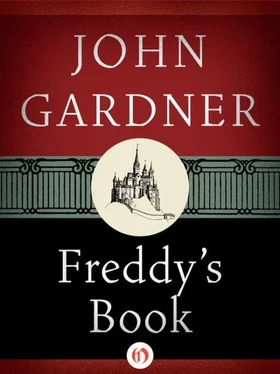For a long time he hardly glanced at the statue itself, but looked instead at the people — first at strangers, then at his wife, then at his children. When he did turn at last to the statue, the sight struck him like a fist. Where Bernt Notke got the massive blocks of wood — to say nothing of the skill at carving, to say nothing of the vision — God only knew. Every notch and curl sang and glowed. The dragon impaled on St. George’s lance seemed to writhe in agony, eyes violently rolling, tail slashing, gleaming talons slicing at the belly of the trembling horse. But none of these did Lars-Goren see that instant.
What he saw was the blank, staring face of the knight, gazing straight forward, motionless, as if indifferent to the monster gazing as if mad or entranced or blind, infinitely gentle, infinitely sorrowful, beyond all human pain. I am Sweden, he seemed to say — or something more than Sweden. I am humanity, living and dead. For it did not seem to Lars-Goren that the monster below the belly of the violently trembling horse could be described as, simply, “foreigners,” as the common interpretation maintained. It was evil itself; death, oblivion, every conceivable form of human loss. The knight, killing the dragon, showed no faintest trace of pleasure, much less pride — not even interest.
He saw again the face of the witch above the churning flames in his dream, the dead swelling faces on the pyres of Stockholm, his son’s cold stare. “When I become lord here, there’ll be no more burning of witches.”
Though it seemed to make no sense, Lars-Goren heard himself saying — his hand on his son Erik’s shoulder—“Very well, you shall be lord here.”
He looked down at Erik’s face, to see if he’d spoken it aloud, as he imagined. His son, in alarm, looked up at him, as if he thought his father had gone mad.
“Very well,” Lars-Goren said, and nodded.
His son met his eyes, but his face now showed nothing, as blank as the face of the knight staring straight into the sun.
8.
ON THE NIGHT BEFORE THE DAY he was scheduled to leave, Lars-Goren sat at the fireplace with his family, Andrea on his knee, Gunnar on the bench beside him. Pia sat across from him, on the bench beside her mother. Erik moved restlessly in the shadows behind them, as if the room were too small to contain his ambition and desire. Lars-Goren was talking of his visits, as a child, to Lappland.
“Strange people,” he said, “if one can really call them people.” He felt embarrassed and disloyal and quickly made an effort to explain. “They’re people, of course,” he said, “as human as any of us. They love their children, love their incredible white country and their reindeer. The Lapps work and play like the rest of us, and they’re religious, just as we are. That’s not what I meant.”
He explained, as well as he could, what he meant. His wife gazed into the fire, half smiling, her hand on Pia’s arm. Perhaps the reindeer were the secret, he said. The reindeer gave the Lapplanders everything they had — food, clothes, shelter, love-tokens, even the devices of their religion. In Lappland nothing grew but what was food for reindeer, so the Lapps ate virtually nothing but the reindeer themselves, blood and meat and the marrow of their bones. For houses and sleds they used reindeer bones, horns, and hides. Perhaps for that reason after all these years the minds of the Lapps had come to be partly reindeer minds, preternaturally alert to every change in the wind, alert to mysteries no ordinary human being could grasp.
But that too, he realized, was not exactly what he meant.
“It’s something about the simplicity,” he said, “the absolute simplicity of the landscape, the light, the inescapable concern with necessities, nothing more.”
Lars-Goren fell silent, staring into the fire. Here too, in Hälsingland, life was simple, he thought; or simple enough. His daughters would grow up and marry neighboring lords, his sons would take care of his villages and lands, oversee the planting and harvesting, building and razing.
Now his son Erik came to the glow of the fireplace and, after a moment, sat down on the floor beside Gunnar.
Pia said, “I wish you could stay with us, Pappa.”
Lars-Goren looked at her, then at his wife. “I wish I could too,” he said. “Soon, perhaps.”
Now he was thinking again of the Devil, how on the night he’d sought them out he’d told Gustav his infinitely complicated schemes, and how Gustav had listened in secret fascination, fitting his plans into the Devil’s complexity. He saw the jumble of bodies on Sodermalm’s pyres, the clutter of leaflets blown like leaves through Stockholm’s streets, after Gustav seized the Lutherans’ printing press and made it his voice.
“Are you all right, Lars-Goren?” his wife asked.
Only now did he realize that he’d covered his eyes with his hand. “I’m fine,” he said.
“We should all go to bed,” she said, but without full conviction.
“Not yet,” he said.
For another half-hour they sat staring into the fire, six glowing shapes like one. At last his wife rose and came to touch his shoulder. He nodded, took her hand, and stood up, lifting Andrea and carrying her, asleep, on one arm.
When Lars-Goren looked in on him, saying goodnight, his son Erik said, “Father?”
Lars-Goren waited, standing beside the bed.
After a moment, Erik said, “The trouble is, it’s not possible to be like the Lapps.” His head was raised slightly from the pillow.
Lars-Goren put his hand on the boy’s white shoulder. “No, I know,” he said. He leaned down and kissed the boy’s forehead. Then he went to his wife.
“I must think about this queer streak of fear,” he thought, for it was creeping up on him again, he found, now that he was going back. “If I’m not afraid of death and I’m not afraid of hell—” But he could push the thought no further. To the marrow of his bones he was a reasonable man, yet here, real as life in his mind’s eye, was this saurian being with the goatish smell, this idiot god, by all evidence, who could make him tremble where he lay.
“Suppose the world makes no sense,” he thought, “no sense whatsoever. Suppose good is evil and evil is good, or that nothing is either good or evil.” It was a thought that should have alarmed him, he told himself, but though he played with the idea, trying to feel alarm, he saw that the more he played with it, the more he felt nothing whatsoever. “Perhaps it’s this that makes a monster like Bishop Brask,” he thought. He concentrated on the idea of Bishop Brask, cut off from heaven by boredom and despair, a man who no longer had feeling for anything except, perhaps, style. He, Lars-Goren, could become a man like that. Surely, that was evil, that should make him tremble! But he felt no slightest tingle of alarm.
Beside him, lying on her back, his wife asked softly, “Lars-Goren, what are you thinking?”
“Shall I tell you the truth?” he asked.
When she said nothing, he said, “I’m afraid of the Devil.” He told her what had happened, and how he’d felt an overwhelming, senseless terror.
She rolled over in the darkness and put her bare, soft arms around him. “Perhaps it’s only rage,” she said, and kissed his cheek.
“Rage at what?” he asked, drawing back a little. “Do I seem to you a man of senseless rages? Rage at what?”
“Just rage,” she said. “Is it so terrible to feel rage for no reason?”
The thought was comforting. Instantly, he began to think of reasons for his senseless rage.
1.
LONG BEFORE HE CAME to the dales of Dalarna, Lars-Goren heard rumors of the trouble there. The Devil was everywhere, gleefully whispering into the miners’ ears. Sometimes he was seen at public meetings, ranting in the torchlight in the shape of a hunchbacked country priest or a twisted old copper hauler. Sometimes he appeared in the darkness of the mines themselves, dropping insinuations about Gustav’s ways.
Читать дальше











